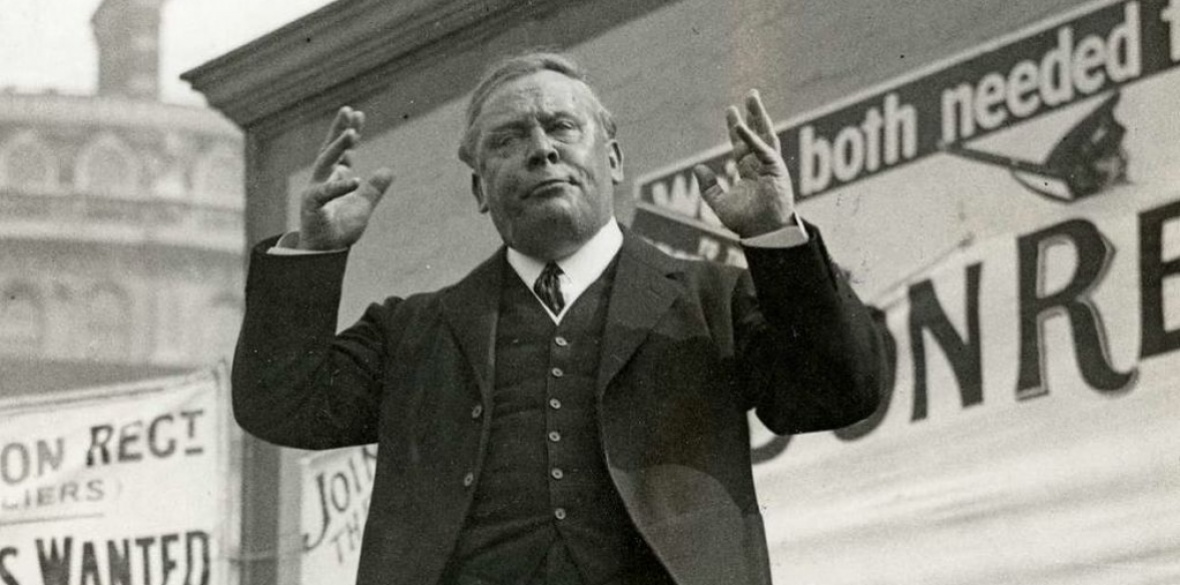This is the last article you can read this month
You can read more article this month
You can read more articles this month
Sorry your limit is up for this month
Reset on:
Please help support the Morning Star by subscribing here
THIS year marks the 90th anniversary of the death of the jingoistic populist leader, MP, newspaper journalist, editor and proprietor, serial adulterer, borderline alcoholic, gambler, financier, and convicted fraudster Horatio William Bottomley (1860-1933).
While his name and notoriety are largely forgotten, he cuts a surprisingly modern figure in the age of Nigel Farage, Lee Anderson, GB News, Boris Johnson, and TalkTV.
Politically, his views were mutable, geared to whatever benefited him in terms of career advancement and opportunities for financial speculation — hence his journey from Liberal radicalism to nationalist populism. Bottomley’s incredibly successful “patriotic” weekly paper John Bull and recruitment rallies during WWI gave him access and influence over millions.
His message was simple: Bottomley was for “the common man” and, pre-empting Margaret Thatcher, against “the enemy within.”
Alike in the rigid ideological certainty of GB News, the Telegraph, the Mail, Sp!ked and TalkTV, Bottomley’s slogan for his paper was, “If you read it in John Bull, it is so.”
Bottomley wasn’t born into privilege, differing from the likes of Johnson, Farage, and Reform Party leader Richard James Sunley Tice, who, unsurprisingly, were all privately educated.
In his eloquence, Bottomley contrasts mightily with the current leader of the “Tory yobbo tendency,” MP “30p” Lee Anderson, who glories in displays of wilful ignorance and crudity, demonstrated by his recent call for asylum-seekers to “fuck off” back to France.
Raised in almost Dickensian circumstances, Bottomley was born in London’s impoverished Bethnal Green to tailor’s cutter William King Bottomley and Elizabeth, nee Holyoake, whose family had strong connections with radical secularism; ironic given their son’s later right-leaning politics.
After their early deaths, Bottomley and his older sister Florence were farmed out to their uncle, and thence to foster parents, who adopted his sibling, but unlucky Horatio was consigned for five years to the Dotheboys-like Josiah Mason orphanage in Erdington, Birmingham.
Bottomley credited the institution with preparing him for adult life, which for him began at just 14 when he decided to cut short his stay and escape to London to join his sister.
After this stereotypically hardscrabble Victorian childhood, the naturally intelligent Bottomley caught his first real break when he joined a firm of City solicitors as a junior clerk, where his knowledge of shorthand, facility with legal procedure and appetite for hard work stood him in good stead.
He also developed relationships with his mother’s network of political friends, who also provided some of the education he previously lacked.
Bottomley skilfully used his occasional lack of polish in deflecting snobbery; at a 1920 speech to the Oxford Union, he shamed braying undergraduates thusly, “Gentlemen: I have not had your advantages. What poor education I have received has been gained in the University of Life.”
Writer Beverley Nichols commented at the time: “After that brief remark, any men who laughed at his pronunciation or his mannerism would be cads, and they knew it.”
Bottomley’s early radical leanings present a clear contrast with Nigel Farage and his alleged teenage flirtation with fascism at Dulwich College.
Even at this opening stage in his professional life, Horatio’s character traits were clearly visible, namely charm, eloquence, profligate generosity, greed, lust, fondness for alcohol, and overweening ambition.
Many of these are analogous to those of would-be world king and fellow magazine editor Boris Johnson, although the former PM shunned the sheer hard graft that Bottomley put in, and is famously loathe to part with cash, his parsimony extending to failing to pay interns for coffee runs at the Spectator, welching on bets, and sponging off his various paramours.
No footage exists of Bottomley orating, but apparently, he could whip audiences into a frenzy as his voice grew louder and more intense, predating both Hitler and Mosley in this respect. Mirroring some of the techniques adopted by the Nazis, he also organised bands of marching supporters to disrupt opponent’s speeches.
Timothy West played Bottomley in an episode of 1972’s BBC series The Edwardians, providing a glimpse into the ability to work his charisma on the dupes who were so willingly humbugged.
From humble law office clerk, Bottomley’s career progressed rapidly, and by age 26 he owned a publishing company, preparing to launch himself into politics as a Liberal.
Concurrently, his penchant for financial skulduggery was already well underway, but he always appeared to bounce back (another trait shared by some of his spiritual heirs), winning court cases through his eloquence and brushing off bankruptcies, even at the time describing himself as “more or less honourable” — a phrase that predates Johnson’s frequent attempts to justify himself, minus Bottomley’s agreeable self-depreciation.
Bottomley’s ability to snow people was such that one dupe, who had been conned out of £40,000, went so far as to defend the huckster: “I have heard him speak. I won’t have you say a word against him. Anyone who says a word against Bottomley I will quarrel with. I am not sorry I lent him the money, and I would do it again.”
But Bottomley could be his own worst enemy in his witticisms. When one of his office boys was caught stealing a postal order, he said: “Well, damn it all, it’s only sixpence, I know, but I suppose he has to begin somewhere.”
By 1906 he was both an MP and the editor and proprietor of the hugely popular weekly John Bull tabloid, which had a circulation of half a million sales (and many more readers) at its height — which dwarfs the performance of the highest ratings on GB News and TalkTV combined.
But inevitably, more scandals followed, as Bottomley frustrated his own ambition to be Chancellor of the Exchequer with his habitual scams and ruses, including sweepstakes, lotteries, race-fixing and various Ponzi-type schemes.
With his fellow Liberals disdaining his obvious chicanery, he moved ever rightward, claiming to stand up for the “man in the street,” a line which both Anderson and Farage are happy to parrot.
Bottomley’s apex came in WWI, when he reinvented himself as a leading patriot for the Allied cause, addressing recruitment rallies (and earning a then astronomical £27,000 in the process) for the government and stiffening national resolve.
Like the headbanger wing of the Tories, the Daily Mail and Tice’s Reform Party, Bottomley was fond of accusing the left of betrayal; during the Great War he called for pacifist labour leaders Keir Hardie and Ramsay MacDonald to be tried for high treason and “shot at dawn.”
After the war, Bottomley’s misdeeds finally caught up with him.
In 1922, his Victory Bonds Club fiddle, described by a bilked former colleague Reuben Bigland as Bottomley’s, “latest and greatest swindle,” resulted in a sentence of seven years penal servitude and formal ejection from the House of Commons — the latter a foreshadowing of Johnson’s censure this year.
Bottomley’s persuasive abilities were still in evidence at his trial, as the judge agreed to a 15-minute adjournment each day of the proceedings for the accused to down a pint of champagne for “medicinal purposes.”
The prison chaplain came upon Bottomley stitching mailbags at Wormwood Scrubs: “Sewing, Bottomley?” he asked, to which the convict replied: “No — reaping.”
Difficult to imagine Farage, Anderson, or Johnson possessing the wit to respond in a similar fashion.
Released after five years, Bottomley lived the rest of his life in near-poverty and worsening health, his attempts to resurrect his career via new publishing ventures and music hall appearances doomed to failure.










